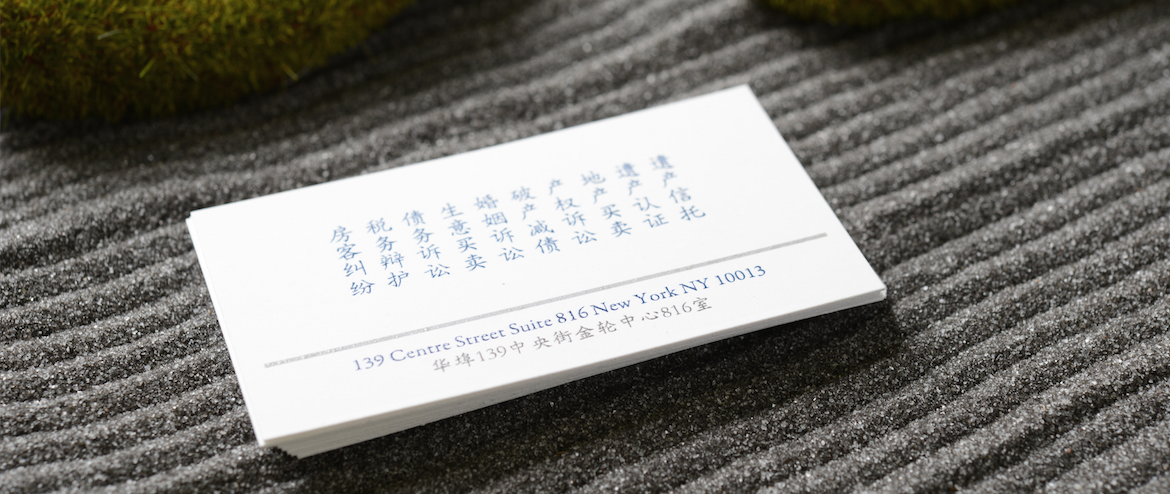
When doing business in China, exchanging business cards is an essential part of the introduction process. Chinese business cards, also known as ming pian, represent the person to whom you are being introduced, making it important to handle them with respect. It is customary to study the card for a while and then put it on the table next to you or in a business card case.
To ensure that your business card is well received, it is recommended to have it translated into Simplified Chinese on one side. This shows that you are making an effort to understand and respect the local culture. It is also advisable to have ample stocks of business cards as almost everyone you meet will want to exchange one with you.
At AsianBusinessCards.com, you can find services for typesetting, localization, and full-color translated Asian business cards. This includes English & Japanese business cards, English & Chinese business cards, and English & Korean business cards. They also provide business card translation in over 30 different languages. With these services, you can make sure that your business cards are culturally appropriate and effective in making a good impression.
Importance of Business Cards in Chinese Culture

In Chinese business culture, exchanging business cards is an essential part of the introduction process. Business cards are seen as a representation of your identity, and they hold a significant amount of importance in Chinese culture.
When you are handed a business card, take a moment to look at it and show interest. It is considered impolite to put it away immediately without acknowledging it. Instead, take the time to read the card and ask questions if necessary. This shows that you respect the person and their business.
In China, business cards should be exchanged at the beginning of a meeting. It is recommended to have one side of your card translated into Chinese, using simplified characters for mainland China, Singapore, Malaysia, and Indonesia. This gesture shows that you are making an effort to communicate with your Chinese counterparts and that you are respectful of their culture.
It is important to handle the business card with care and respect. Do not write on it or put it in your pocket immediately. Instead, place it in a cardholder or on the table in front of you. This shows that you value the card and the person who gave it to you.
In Chinese business culture, the exchange of business cards is not just a formality, but it is also a way to establish a relationship. The act of exchanging business cards is seen as a sign of trust and respect. It is a way to start building guanxi, which is the concept of building relationships and connections for business purposes.
In summary, business cards hold a significant amount of importance in Chinese culture. They are seen as a representation of your identity and a way to establish a relationship. Make sure to handle them with care and respect, and take the time to show interest in the card and the person who gave it to you.
Design and Quality of Chinese Business Cards

When it comes to designing Chinese business cards, it’s important to keep in mind the cultural differences and etiquette. The design should be simple and elegant, with a focus on the company’s logo and contact information.
In terms of quality, it’s recommended to use high-quality paper and printing techniques to convey a sense of professionalism. Traditional Chinese business cards are printed on thick, textured paper with black ink, while modern designs may incorporate color or metallic accents.
When it comes to the layout of the business card, it’s common to have dual-sided cards with English on one side and Simplified Chinese on the other. It’s important to use the correct characters for the region you are doing business in – Simplified characters are used in mainland China, Singapore, Malaysia, and Indonesia, while Traditional characters are used in Taiwan and Hong Kong.
Typesetting is also an important consideration when designing Chinese business cards. It’s recommended to work with a professional typesetter who is fluent in both English and Chinese to ensure accuracy and proper formatting.
Overall, the design and quality of your Chinese business card can make a significant impact on your business relationships in China. By following cultural etiquette and paying attention to the details, you can convey a sense of professionalism and respect for Chinese culture.
Translation and Language Considerations
When it comes to Chinese business cards, translation and language considerations are crucial. It is essential to ensure that your business cards are translated accurately and professionally. Having your business cards translated by a translator or translation agency is always recommended to ensure that the most suitable and professional language is used.
In China, exchanging business cards is customary in professional settings. Therefore, having your business cards translated into Mandarin, Cantonese, Traditional Chinese, Simplified Chinese, French, German, or any other relevant language is vital for effective communication and building relationships with Chinese clients and partners.
When working on a Chinese business card translation project, it is essential to keep in mind that Chinese is a complex language that requires careful attention to detail. For instance, the use of honorifics and titles is essential in Chinese culture. Therefore, it is crucial to ensure that the translation of your business cards accurately reflects the appropriate level of formality and respect.
Another important consideration is the use of simplified versus traditional Chinese characters. While simplified Chinese is used in mainland China, traditional Chinese is used in Taiwan, Hong Kong, and Macau. Therefore, it is essential to determine the target audience and location when deciding which version of Chinese characters to use.
In summary, accurate and professional Chinese business card translation is crucial for effective communication and building relationships with Chinese clients and partners. It is essential to work with a professional translator or translation agency to ensure that your business cards are translated accurately and appropriately. Additionally, it is crucial to consider factors such as language, culture, and location when working on a Chinese business card translation project.
Etiquette of Exchanging Business Cards in China

Exchanging business cards is an essential part of Chinese business culture. Here are some tips to help you navigate this process with ease:
The Bow
In China, the bow is a sign of respect. When exchanging business cards, it is customary to bow slightly while presenting your card with both hands. The bow should be subtle and respectful, not too deep or exaggerated.
The Handshake
While the bow is the traditional greeting, many Chinese businesspeople are now accustomed to shaking hands with Westerners. However, it is still important to be aware of the cultural significance of the handshake. The handshake should be firm but not overly aggressive. Only your Chinese counterpart should initiate the handshake.
The Nod
Nodding is a common greeting gesture in China. It is a sign of respect and acknowledgement. When someone greets you with a nod, it is polite to nod back in return.
Age and Rank
In Chinese culture, age and rank are important factors in business relationships. When exchanging business cards, it is important to present your card to the oldest or most senior person first. If you are unsure of someone’s rank, it is best to err on the side of caution and present your card to the person who appears to be in charge.
Body Language and Business Attire
Body language is an essential part of Chinese business culture. It is important to maintain eye contact and a respectful posture when exchanging business cards. Business attire should be conservative and professional.
Gifts and Alcohol
Gift-giving is a common practice in Chinese business culture. If you are presenting a gift, it should be wrapped in red paper, which is considered lucky. It is also customary to bring a small gift for the person you are meeting with. Alcohol is often served during business meetings, but it is important to drink in moderation and not to become intoxicated.
WeChat and Bribery
WeChat is a popular messaging app in China that is often used for business communication. However, it is important to be cautious when using WeChat for business purposes, as it is also a platform for bribery and corruption. It is important to maintain ethical business practices and avoid any behavior that could be perceived as corrupt or unethical.
Overall, exchanging business cards in China is a complex and nuanced process. By following these tips and being respectful of Chinese culture, you can navigate this process with confidence and ease.
Oliver dives into graphic design, branding, and marketing with passion. Beyond pixels and paper, he’s into boxing, CrossFit, and all things fitness. Oliver’s writing reflects his expertise and dedication to staying on top of industry trends.